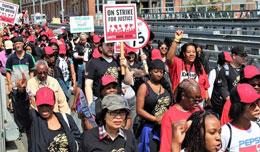COVID layoffs leave hotel workers in the cold

By New Canadian Media
The immigrant from Bangladesh worked in the housekeeping department of Roehampton Hotel in Midtown Toronto from the time he moved to Scarborough in 2005. He has an unemployed wife and four small children aged nine, seven, three years and a fourth-month-old to support.
Molla, 47, has been barely managing on the government EI relief of $500 per week since he was laid-off in March, along with all the other staff. “Prices are rising every day. It’s very hard to make ends meet,” he says.
Others are left with a fraction of their income. Kazi Tasmin’s work-hours as a room attendant were slashed from six days a week to three hours, twice a week from March last year when Fairmont Royal York hotel in Toronto laid off 90 per cent of their staff.
Tasmin, 52, has been dedicated to the hotel for 22 years since she moved from Bangladesh in 2000. It has been difficult to support her ailing husband and two children on one income. Her husband had an unexpected bypass surgery soon after their arrival that affected his kidneys. “He needs weekly dialysis and strong medications,” she says. If it was not for her union, Unite Here Local 75, affording costly medications would have been impossible.
Unite Here Local 75 is one of the unions that advocates the rights of Canadian hospitality workers, majority of who are racialized and immigrants, mostly women. But Tasmin’s despair cannot be resolved by the union alone. “After September, our government allowance will be stopped. I live in an apartment for which I took deferral for eight months but after next month, that stops too. What then?”
Not every hotel is unionized to offer emergency support. Novotel Hotel North York where Anna Kara, 45, has worked as a restaurant server is one of them. She moved from Bulgaria with her husband and seven-year-old son in 2008 where she served the hotel industry as well. “Moneywise it is better in Canada. Our hotel supports the staff with perks and benefits. They value their employees here,” she explains about her decision to move.
All was well until the pandemic shoved things downhill. The hotel laid off their entire staff in March 2020 and closed down indefinitely. New variants worsened the pandemic after January 2021 but medical benefits were discontinued. “Our hotel can’t afford it anymore,” says a distraught Kara.
Thankfully, she had the foresight to earn a diploma teaching English as a second language two years back. That has opened another door as a part-time supply teacher with the York District School Board.
While Molla hopes to be called back to the hotel when things look up, Tasmin is busy upgrading her computer and customer service skills at her union’s Hospitality Training Action Centre to apply for work elsewhere if her wages are not increased soon.
Tasmin also hopes to help her husband with Uber Eats food delivery but she can’t let him drive far. “It’s risky to interact with people in his fragile health condition. That scares me more,” she says.
The hotel industry in Canada enjoyed a healthy revenue of over CAD 17.5 billion before the catastrophic drop, reports Statistics.com. Among the 170 properties in the GTA, Toronto hotels ranked sixth highest in room occupancy rate across North America. However, since the pandemic hit, tourism has taken an unprecedented blow.
In Toronto where 47 per cent of the population are immigrants, laid-off hotel staff has had it hard. This does not make it any easier for hotel owners and managers.
Telling his staff to stay at home was as emotionally difficult for Manoj Nair as it was for them
“Over 80% of my workers are immigrants, mostly from Asia and Latin America. Telling them to stay at home was as emotionally difficult for me as it was for them,” says Manoj Nair, General Manager of Crowne Plaza hotels and resorts in Kitchener, Ontario. “2020 was supposed to be one of our best years until March when things started to slide downhill. Now, we are over 90% on loss.”
Ajay Shah, owner and president of Fairfield by Marriott in the tourist town of Belville, Ontario says that the hotel was doing extremely well earlier. “We were planning to recall the staff in 3-4 months. But as the lockdown stretches, we’re unable to recover the losses and had to let go of more. It will be a challenge to open till business picks up in a year or two. Who knows how many hotels will sustain till then!”
Ajay Shah was hoping to recall his staff but is unable to do so as the lockdown stretches indefinitely
Reetu Gupta, President and CEO of the Easton’s Group of hotels says, “It really depends on the rollout of vaccinations and the government. From a business standpoint, we have kept most of our doors open and tried to save as many jobs as possible.”
To sustain business, a few hotels have converted into makeshift healthcare centres to host COVID patients. But both Gupta and Nair have refrained from going down that road. “Our industry is hospitality, not healthcare,” explains Gupta. Nair adds “We recently spent over 20 million dollars on hotel renovations. We can’t afford to rent it out to shelters not knowing if they will keep it in good shape. This has happened to other hotels and they don’t have the financial health to renovate.”
The government is enforcing air travelers to quarantine themselves in hotels once they reach Canada, effective from February 22nd. Would that boost business? “The purpose of this program is to stop people from travelling, not encourage,” says Reetu Gupta. “Right now, we have a stay-at-home order. I don’t think it’s going to boost our business.” “For us, as soon as things start looking up, everybody will be called back,” she assures.









